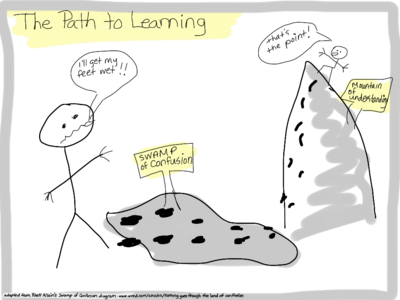Documentation:Learning Commons:Content/Myths About Learning/Myth 3 Easy
Myth 3: If it's easy, I must be learning.

Often, we are fooled into thinking we understand something, because terms or concepts sound familiar. You might find yourself feeling like you really understand the material, when your brain is really just responding to the fact that it's seen this exact material before. To add to that, if it is presented in a clear and pleasing manner, it might create an illusion of fluency. This is called a fluency bias or familiarity trap—when everything seems familiar, your brain doesn't have to work so hard, so it feels like you've mastered the material, even though you haven't. Try to mix things up as you're studying.
More and more, evidence suggests confusion is where deep learning lies. It might even be that some level of confusion activates parts of your brain which regulate learning and motivation, helping you achieve a greater level of understanding. If you're not confused, you might not be learning. See Learning Goes Through the Land of Confusion by Rhett Alan, a physics professor at Southern Louisiana University, for a brief explanation. Don't let yourself get discouraged if it feels like you aren't 'getting it': that's a good sign.
Other science educators have found support for the idea that confusion is important to learning. Eric Mazur, a Harvard physics education researcher, has done some interesting research on the topic—a summary of his findings can be found in this blog post. Another researcher and science educator, Derek Muller, has looked at the relationship between learning and video. Watch this video where he explains his findings and talks about the strengths and weaknesses of Khan Academy.
|